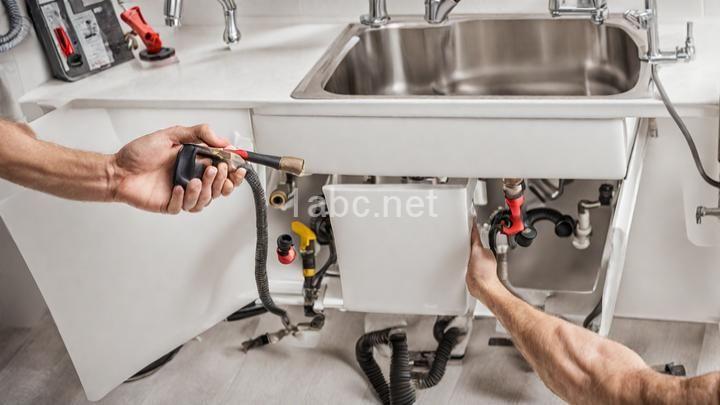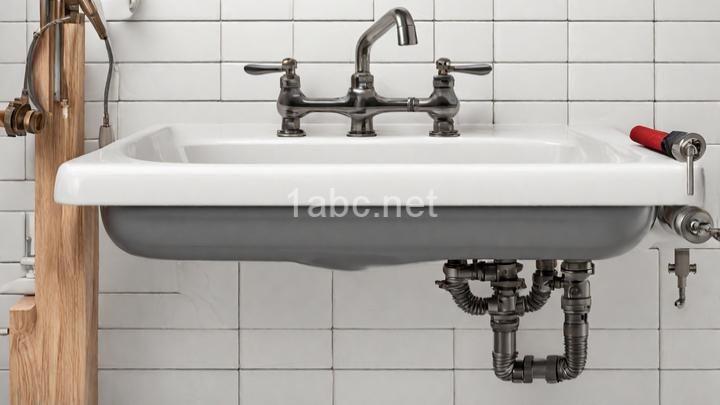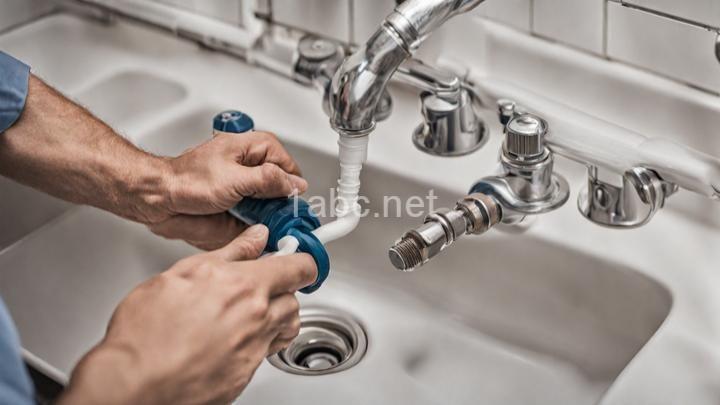The Top 10 Home Plumbing Mistakes to Avoid
1. Ignoring Leaky Faucets:
2. Neglecting Slow Drains:
3. Overusing Chemical Drain Cleaners:
4. Mishandling Garbage Disposals:
5. Using Incorrect Toilet Cleaners:
6. Neglecting Water Heater Maintenance:
7. Overtightening Plumbing Connections:
8. Using the Wrong Tools:
9. Ignoring Warning Signs:
0. DIY-ing Complex Plumbing Projects:
Conclusion:

Welcome, homeowners! In today's blog post, we'll be discussing the top 10 home plumbing mistakes that you should avoid. By being aware of these common errors, you can save yourself from costly repairs and ensure your plumbing system functions smoothly. Let's jump right in!
1. Ignoring Leaky Faucets:
Leaky faucets may seem like a minor annoyance, but they can waste gallons of water and lead to higher utility bills. The constant drip, drip, drip can add up over time, resulting in a significant amount of water being wasted. Not only is this bad for the environment, but it's also bad for your wallet.
The solution to this problem is simple: promptly fix any leaks. Most leaks are caused by worn-out washers, which can easily be replaced. If you're handy with tools, you can try fixing the leak yourself. However, if you're not confident in your plumbing skills, it's best to contact a professional plumber who can quickly and efficiently fix the issue for you.
2. Neglecting Slow Drains:
Slow drains are often caused by clogs that gradually build up over time. Ignoring them can result in complete blockages and even sewer backups, which can be a messy and expensive problem to fix. It's important to address slow drains as soon as you notice them to prevent further damage to your plumbing system.
To prevent clogs, use drain screens to catch debris before it goes down the drain. Avoid pouring grease or hair down the drain, as these can easily accumulate and cause clogs. Additionally, consider using natural drain cleaners regularly to keep your drains flowing smoothly. A mixture of baking soda and vinegar can work wonders in breaking down clogs without the use of harsh chemicals.
3. Overusing Chemical Drain Cleaners:
Chemical drain cleaners may provide a temporary fix for clogs, but they can also cause more harm than good. These cleaners contain harsh chemicals that can damage your pipes over time and harm the environment. The chemicals can eat away at the pipes, leading to leaks and other plumbing issues.
Instead of relying on chemical drain cleaners, opt for natural alternatives. As mentioned earlier, a mixture of baking soda and vinegar can be an effective and eco-friendly way to clear clogs. If the clog is particularly stubborn, consider using mechanical tools such as plungers or drain snakes. These tools can help dislodge the clog without damaging your pipes.
4. Mishandling Garbage Disposals:
Garbage disposals are a convenient appliance in the kitchen, but they can easily become a source of plumbing problems if not used properly. Improper use of garbage disposals can lead to jammed blades, clogged pipes, and even motor burnouts.
To avoid these issues, it's important to follow a few simple rules. First, avoid disposing of fibrous foods such as celery or hard items like bones. These can easily get stuck in the disposal and cause clogs. Second, always run cold water while using the disposal to help flush away any debris. And finally, be sure to clean the disposal regularly to prevent buildup and odors. Simply grinding up ice cubes or using a mixture of baking soda and vinegar can help keep your disposal in good working order.
5. Using Incorrect Toilet Cleaners:
When it comes to cleaning your toilet, it's important to use the right cleaners. Harsh chemicals found in certain toilet cleaners can corrode pipes and cause damage to the flushing mechanism. It's crucial to choose toilet cleaners that are specifically labeled as safe for your plumbing system.
Alternatively, you can opt for natural cleaning solutions. A mixture of vinegar and baking soda can effectively clean and deodorize your toilet without causing any harm to your plumbing. Additionally, regular cleaning and maintenance of your toilet can help prevent the buildup of mineral deposits and other debris that can lead to clogs and other issues.
6. Neglecting Water Heater Maintenance:
Your water heater plays a crucial role in your home's plumbing system, providing hot water for showers, washing dishes, and other daily tasks. However, many homeowners neglect to properly maintain their water heaters, which can lead to a variety of problems.
Lack of maintenance can cause sediment buildup in the tank, reducing its efficiency and shortening its lifespan. To prevent these issues, it's important to flush the water heater annually. This involves draining the tank to remove any sediment or debris that has accumulated over time. Additionally, it's important to check the pressure relief valve regularly to ensure it's functioning properly. If you're not comfortable performing these tasks yourself, it's best to hire a professional plumber to do it for you. They have the knowledge and experience to properly maintain your water heater and ensure it's working efficiently.
7. Overtightening Plumbing Connections:
When it comes to plumbing connections, it's important to find the right balance between tight enough to prevent leaks and too tight that it causes damage. Overly tightening plumbing connections can lead to leaks and damaged fixtures.
To avoid this mistake, use a wrench to tighten connections just enough to prevent leaks without applying excessive force. It's important to remember that most plumbing connections are made of plastic or metal, which can easily be damaged if too much pressure is applied. If you're unsure about how tight a connection should be, it's always best to consult a professional plumber.
8. Using the Wrong Tools:
Using improper tools for plumbing repairs can cause damage to pipes or fittings, resulting in even more costly repairs. It's important to invest in basic plumbing tools like adjustable wrenches, pipe cutters, and pliers for DIY projects. These tools will help you tackle simple plumbing tasks with confidence.
However, it's important to recognize your limitations. If a plumbing repair seems beyond your skill level or requires specialized tools, it's best to contact a professional plumber. They have the expertise and equipment needed to handle complex plumbing repairs and can ensure the job is done correctly the first time.
9. Ignoring Warning Signs:
One of the biggest mistakes homeowners make is ignoring warning signs of plumbing issues. Often, homeowners tend to overlook low water pressure, unusual odors, or other signs until it's too late. By ignoring these warning signs, you're allowing the problem to worsen and potentially causing more damage to your plumbing system.
It's important to act promptly if you notice any signs of plumbing issues. This could include sudden changes in water pressure, slow drains, unusual odors, or water stains on walls or ceilings. By addressing these issues early on, you can prevent major problems down the line and save yourself from costly repairs.
1
0. DIY-ing Complex Plumbing Projects:
While it's great to tackle simple plumbing projects on your own, attempting complicated projects without proper knowledge or experience can result in costly mistakes and potential damage. It's important to recognize your limitations and leave complex plumbing tasks to licensed professionals who have the expertise and equipment needed.
Installing new pipes, replacing a water heater, or remodeling a bathroom are just a few examples of complex plumbing projects that should be left to the professionals. These projects require a high level of skill and knowledge to ensure they're done correctly and safely. Hiring a professional plumber may cost more upfront, but it can save you from headaches and costly repairs in the long run.
Conclusion:
By avoiding these top 10 home plumbing mistakes, you'll be well on your way to maintaining a healthy and efficient plumbing system. Remember, prevention is key! Regular maintenance, prompt repairs, and knowing when to call a professional plumber are all essential to keeping your plumbing system in good working order. If you're unsure about any plumbing issue or need assistance, don't hesitate to reach out to a qualified plumber. They can provide expert advice and ensure your plumbing is functioning at its best. Stay tuned for more helpful tips and tricks in our future blog posts!
FREQUENTLY ASKED QUESTIONS
What is The Top 10 Home Plumbing Mistakes to Avoid?
Here are the top 10 home plumbing mistakes to avoid:
- Ignoring Leaks: Many homeowners tend to overlook minor leaks, which can lead to major problems if left untreated. It's important to fix leaks promptly to prevent water damage and mold growth.
- Improper Toilet Usage: Flushing items like wipes, paper towels, or feminine hygiene products down the toilet can result in clogs and sewer backups. Only toilet paper should be flushed.
- DIY Repairs without Proper Knowledge: Attempting to fix complex plumbing issues without the necessary expertise can often worsen the problem. It's best to hire a professional plumber for complicated repairs.
- Using Chemical Drain Cleaners: Chemical drain cleaners can corrode pipes and cause more harm than good. Instead, consider using natural or mechanical methods to clear clogged drains.
- Over-tightening Connections: Over-tightening fittings and connections may cause damages to pipes, leading to leaks. Follow manufacturer's guidelines and apply the appropriate amount of torque when working with plumbing connections.
- Incorrectly Installed Water Connections: Incorrectly installing water supply lines can result in leaks and water damage. It's important to ensure proper alignment and use appropriate tools when connecting pipes.
- Ignoring Water Pressure Issues: High water pressure can strain pipes and fixtures over time. Use a pressure regulator if necessary to prevent damage and leaks.
- Neglecting Regular Maintenance: Proper maintenance is crucial to keep your plumbing system in good condition. Schedule regular inspections and maintenance tasks to catch potential issues before they become major problems.
- Misusing Garbage Disposal: Using a garbage disposal to dispose of fibrous or starchy foods, grease, or large amounts of food scraps can cause clogs and damage the disposal unit. Be mindful of what you put down the disposal.
- Not Knowing the Location of Shut-Off Valves: In case of emergencies or plumbing repairs, it is important to know the location of shut-off valves for water and gas. Familiarize yourself with their locations to prevent further damage in case of leaks or bursts.
By avoiding these common plumbing mistakes, you can help maintain a healthy plumbing system in your home and save costs on repairs in the long run.
Why should I be concerned about home plumbing mistakes?
It is important to be concerned about home plumbing mistakes because they can lead to a variety of issues and costly repairs. Here are a few reasons why you should take home plumbing mistakes seriously:
- Water damage: A plumbing mistake, such as an improperly installed pipe or a leaky connection, can result in water damage to your home. Water damage can be extensive, leading to structural problems, mold growth, and damage to your belongings.
- Increased utility bills: Plumbing mistakes can cause water leaks, which can result in a significant increase in your utility bills. Even a minor leak can waste a significant amount of water over time, leading to higher costs.
- Health risks: Plumbing mistakes can create an environment for the growth of mold and mildew. Exposure to these substances can cause allergies, respiratory problems, and other health issues, especially for individuals with weakened immune systems.
- Plumbing system inefficiency: If your plumbing is not installed correctly or if there are mistakes in the system, it may not function efficiently. This can result in reduced water pressure, clogged drains, and issues with the overall performance of your plumbing system.
- Decreased property value: If you have plumbing mistakes in your home, it can lower the value of your property. Prospective buyers may be hesitant to purchase a home with known plumbing problems, or they may ask for a significant reduction in the selling price.
By being proactive and addressing any plumbing mistakes or issues promptly, you can avoid these potential problems and ensure the proper functioning of your home's plumbing system.
How can I avoid making these plumbing mistakes?
Avoiding plumbing mistakes can save you time, money, and headaches. Here are some tips to help you avoid common plumbing mistakes:
- Plan and research: Before starting any plumbing project, take the time to plan and research. Understand the steps involved, the tools required, and any potential challenges you may face. This will help you avoid unnecessary mistakes.
- Use proper tools and materials: Always use the correct tools and materials recommended for the job. Using the wrong tools or low-quality materials can lead to mistakes or even damage to your plumbing system.
- Turn off the water supply: Whenever you are working on any plumbing fixtures or pipes, make sure to turn off the water supply to avoid accidental flooding or water damage.
- Take proper measurements: Accurate measurements are essential in plumbing projects. Whether you are working on installing new pipes or replacing fixtures, taking precise measurements can prevent mistakes such as leaks or improper fittings.
- Use the right fittings and connections: Ensure that you use the appropriate fittings and connections for your plumbing system. Using mismatched fittings or connections can result in leaks or other issues.
- Follow installation instructions: Whether you are installing a new fixture or repairing a pipe, always follow the manufacturer's installation instructions. These instructions will guide you on correct assembly and ensure proper functioning.
- Test for leaks: After completing any plumbing project, thoroughly test for leaks. This can be done by turning the water supply back on and checking for any signs of water leakage. Fix any leaks immediately to avoid further damage.
- Know your limitations: If a plumbing task seems complex or beyond your expertise, it's best to hire a professional plumber. Trying to tackle advanced plumbing projects without proper knowledge can lead to costly mistakes.
By following these tips and taking your time with plumbing projects, you can minimize the risk of making common plumbing mistakes and ensure a successful outcome.
Are these mistakes common among homeowners?
It would be helpful to know what mistakes you are referring to in order to determine their commonality among homeowners. Could you please specify the mistakes you are referring to?

